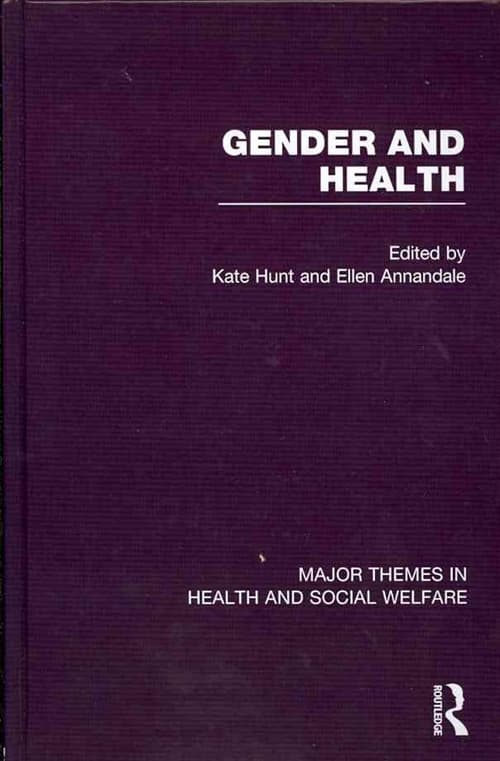
Gender and Health
18 738 kr
18 738 kr
Ti., 15 juli - fr., 18 juli
Sikker betaling
14 dagers åpent kjøp
Selges og leveres av
AdlibrisProduktbeskrivelse
Publisher’s note:
The publishers would like to confirm that for Volume 1: ‘Theoretical and Methodological Developments’ and Volume 3: ‘Gender and Healthcare’ Ellen Annandale was the lead editor and lead author of the introductions. Kate Hunt was the lead editor for Volume 2: ‘Understanding the Patterning of Health by Gender’ and Volume 4: ‘Gender and Health Behaviours’
The order in the printed book did not reflect this distinction, but we are happy to clarify the correct order.
Life expectancy is higher for women than men in almost every country, leading the World Health Organization to suggest that ‘their innate constitution’ gives women ‘an advantage over men’. However, this differential is far greater in some countries (e.g. Japan) than others (e.g. Qatar and Botswana) and rapid changes in the sex differential in life expectancy—as seen in the countries of the former Soviet Union in the last decades of the twentieth century—can only be explained by social factors. Research on health can thus demonstrate how the ways that different societies (historically and cross-culturally) create differential life chances and opportunities for men and women gets ‘written’ on people’s bodies.
Women’s mortality advantage does not translate into better health across all outcomes. For example, women are diagnosed with more depression and more joint pain and associated disability. For many years, it was assumed that the aphorism that ‘women get sicker but men die quicker’ (the so-called ‘gender paradox’) was an adequate and useful summary for gender differences in health, but recent research shows patterns are far more complex. This complexity poses exciting challenges for research on gender and health. Gender inequalities in health provide a window to understand how the social world ‘gets under the skin’ and how human health can be improved.
A tradition of research stemming back to at least the 1960s has highlighted the gendered assumptions that are built into the provision of healthcare. This occurs within the community where women generally shoulder the burden of caring for others, and in formal health systems where the division of labour is often highly patriarchal. Gendered assumptions about the kinds of health problems that men and women suffer from, and about the ways that they relate to symptoms of illness, may bias decision-making by service providers, often in ways that are not beneficial to health.
Issues and themes in and around gender and health such as these continue to generate a huge scholarly literature, and this new collection from Routledge’s Major Themes in Health and Social Welfare series meets the need for an authoritative reference work to help researchers and students navigate and make sense of it. The collection is made up of four volumes which bring together the best and most influential canonical and cutting-edge research. It draws together key works spanning theoretical developments and empirical research which uses a range of qualitative and quantitative methods. With a full index, and thoughtful introductions, newly written by the editors, Gender and Health traces the progress of research in this field and highlights the challenges for future research. It will be valued by scholars, students, and researchers as a vital and enduring resource.
Artikkel nr.
56a1e37b-e1b0-4b37-a951-8a78c6add528
Gender and Health
18 738 kr
18 738 kr
Ti., 15 juli - fr., 18 juli
Sikker betaling
14 dagers åpent kjøp
Selges og leveres av
AdlibrisLignende toppselgere

POP MART Labubu The Monsters Exciting Macaron Vinyl Face Blind Box
699 kr

POP MART Labubu The Monsters Big Into Energy Series Figures Vinyl Plush Pendant Blind Box
699 kr

Øreputer for Bose QuietComfort - QC35/QC25/QC15/AE2 Hodetelefoner Svart
99 kr

Lattafa Angham EDP parfymert vann unisex, 100 ml
925 kr
Tidligere laveste pris:
998 kr

INF TYPE-C Dual SD/TF-kortleser for rask dataoverføring 0
89 kr
Tidligere laveste pris:
99 kr

NÖRDIC Lightning Kortläsare SD UHS-I
240 kr

Malibu Fast Tanning Bronzing Butter with Beta Carotene 300ml
179 kr

Max Smekker
99 kr
Tidligere laveste pris:
164 kr

Afnan Supremacy Collector's Edition Eau De Parfum 100 ml (man)
781 kr

Luftrenseenhet - Renser / Saniterer luften - 20,000 mg/h
699 kr
Anbefalinger til dig

Den felande länken
141 kr

INF Etterfilter til Dyson V11 / V15 akselstøvsuger 3-pakning
229 kr

Hundetrimmer / Potetrimmer - Trimmer for Poter
199 kr

Filter for MSPA oppblåsbare bassenger FD2089 4-pakning
289 kr

INF Støydempende og lydisolerende ørepropper med krok
114 kr
Tidligere laveste pris:
143 kr

INF Øreputer for Bose QC35 I/II, QC25, QC15, QC 2 AE 2, AE 2i, AE 2w, SoundTrue, SoundLink
99 kr
Tidligere laveste pris:
132 kr

3-Pak - Fidget Spinners med Sugekopp for Barn
179 kr

INF Sovemaske 100 % silke Sort
99 kr
Tidligere laveste pris:
124 kr

INF Spiralreflekterende fugleskremsel 10-pakning Sølv 30 cm
119 kr
Tidligere laveste pris:
143 kr

INF Tilbehør til Roborock S5/S6 modeller 7 deler
149 kr
Tidligere laveste pris:
228 kr